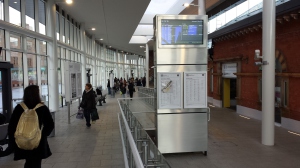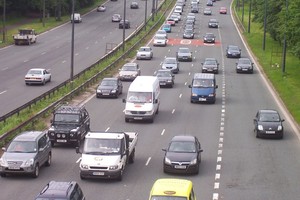Updates on the latest transport planning, strategy, appraisal and funding issues
Altrincham Interchange Regeneration
At the end of 2014, the refurbished Interchange in Altrincham opened. It provides much improved links and facilities for the bus, Metrolink and rail passengers visiting this busy town centre. David was worked on the business case for many years, including during the Annex E, TIF and more recent local funding bids. It's great news the new Interchange is now finally complete.
New Park and Ride Sites Open in York
On 8 June 2014, two new park and ride sites opened in York. The new Askham Bar site provides 1,100 spaces and the A59 Poppleton site has 600 space. Both sites benefit from the tried-and-tested fast, frequent, low-cost bus service which makes Park & Ride one of the cheapest and easiest ways to travel into the centre of York. David had a major part in the successful funding of the two scheme through the DfT's major scheme programme back in 2011, leading the work relating to modelling, appraisal and vfm business case.
New Pot of Local Pinch Point Funding
The DfT has announced the funding of a further 15 Local Pinch Point schemes, worth a total of £25 million, and a 40% lower average funding per scheme than for Tranches 1 and 2.
This brings the total to 87 schemes funded in the three tranches, a total of over £200 million funding. Still over 80 schemes are yet to be funded, but a further £55 million has been made available for existing or new schemes.
Congratulations to the City of York on the funding of the A19 scheme - a scheme that will reduce the impact of flooding. David completed the appraisal of the scheme, including economic disbenefits of flooding.
The DfT will shortly be issuing a further guidance note in respect of the application process for the £55 million remaining in the new pot of £80 million. The deadline for bids is 31 October 2013.
Cycle City Funding
DfT has announced a nationwide drive to promote cycling in cities and national parks across England will be launched today. In total £77 million will be divided between Manchester, Leeds, Birmingham, Newcastle, Bristol, Cambridge, Oxford and Norwich, while the New Forest, Peak District, South Downs and Dartmoor will each share a slice of £17 million funding for national parks. With local contributions, the total new funding for cycling is £148 million between now and 2015.
Clean Bus Technology Fund
Eleven local authorities have been awarded grants from the Clean Bus Technology Fund, which will allow almost 400 buses to be upgraded. Towns and cities in England are set to benefit from £5 million of funding
Funding was awarded based on 5 main criteria:
- whether bids fit objectives of establishing the best technologies and developing the retrofit industry
- air quality impact
- value for money
- deliverability
- whether they offered cross-cutting benefits such as encouraging economic growth
Better Bus Area Funding 2013
The DfT invited applications from local transport authorities to become designated as a BBA. In these areas there will be a gradual transfer of BSOG (Bus Service Operators Grant) from bus operators to the relevant local authority between October 2013 and April 2017 (covering the 2017/18 financial year). The authority will also be provided with top-up funding that will provide an increase in total bus funding in a BBA. Bids required economic appraisal on the value for money of the BSOG and BBA schemes, the former looking at the withdrawal and hence disbenefit of not having a funding stream and the latter of using the funds for alternative use. Decisions on the successful bids are expected in September.
Local Pinch Point Funding Announcements
On the 31 May 2013, DfT announced a further 62 schemes were to be funded by LPPF at a total DfT cost of £166.7m. This made the total number of schemes funded equal to 72 schemes at cost to DfT of £192.4m, some £22.4m over the original budget of £170m.
A total of 170 bids were submitted to DfT from 120 local authorities (21 did not submit a bid) with 5 bids prepared by two authorities (Lancashire and Devon).
Analysis of the bids with a view to identifying themes between those that were successfully funded, and those that were not, produced the following findings:
- 42% of schemes were successfully funded.
- The average payment by DfT was £2.7m per scheme.
- No scheme over £5m of DfT funds got approval.
- No one authority got more than two successful bids.
- DfT did not favour the lowest cost schemes, the highest success rate was for those in the £3-4m DfT funding request range.
- High local contribution levels also appeared not to impact on the DfT decisions, with 49 of the 72 successful schemes providing a 30%-35% local contribution (30% was the minimum).
- Schemes linked to generating jobs and reducing congestion had the highest success rate.
- Over 60% of schemes in the South-East region (excluding London) gained funding, but only 23% of North-West and 27% of East Midlands schemes were successful.
- The rate of success was significantly higher in cases where the authority had provided the full bid, including supporting information, on their website (this was a required by DfT but was not always followed) and had shown a completed Appraisal Summary Table (AST).




